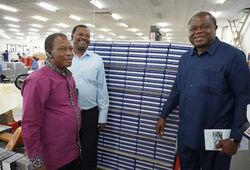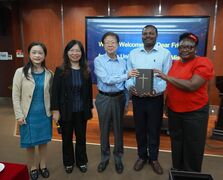01.10.2024

Bishop Mothusi Letlhage from Botswana (left), Bishop Abednego Keshomshahara (centre) and Bishop Alex Gehaz Malasusa (right), both from Tanzania, visiting Amity Printing.

From left to right: She Hongyu (Deputy General Secretary of the Amity Foundation), Ling Chunxiang (General Secretary of the Amity Foundation) and Qiu Zhonghui (Director of the Board of the Amity Foundation), Abednego Keshomshahara (UEM Moderator) and Félicité Ngnintedem (Executive Secretary Division Global Programs I and member of the UEM Management Team).

During the guided tour through the world's largest Bible printing press, Bishop Malasusa discovered the hymn books that his diocese had just ordered at Amity Printing.

Cooking services of Amity Foundation for elderly people, as a very practical part of the visit: lunch break at the Leadership Training. All Photos by: Martina Pauly, UEM
“We have been amazed to see that a country which was totally a developing country 40 years ago is now the second biggest economy,” says Bishop Dr. Abednego Keshomshahara. He is the Moderator of the United Evangelical Mission (UEM) and Bishop of the ELCT-NWD* in Tanzania: “And this is seen through a range of infrastructures, buildings, houses, roads, social services, cleanliness and everything. It is very encouraging to see that it is possible, even for other developing countries: if they are committed, they can go forward like other countries.”
18 participants from Botswana, South Africa, Tanzania, Cameroon, Indonesia, Sri Lanka, and Germany visited China from 19th to 29th September at the invitation of the Amity Foundation, specifically travelling to the megacities of Shanghai, Nanjing, and Beijing. The Leadership Training is an exchange programme for church leaders of UEM member churches across all three regions and is led this year by Rev. Félicité Ngnintedem, Head Division Global Programs I. On the agenda were visits to the Protestant Church “China Christian Council” (CCC), two local theological colleges, and the Amity Foundation, a long-standing partner of the UEM.
Being Church in the Chinese Context
First, representatives of the Christian community in China provided insights into Protestant life in the People’s Republic, currently home to 1.4 billion people. The Chinese state permits the practice of Christianity within its places of worship. However, Christian symbols, such as crosses or pastoral attire, may not be displayed or worn in public. Asked about the current challenges faced by the Protestant community, Rev. Lian Manhong, Vice President and General Secretary of the CCC, explained that the Chinese contextualisation of the church currently focuses on composing original hymns, incorporating Chinese musical instruments, developing indigenous liturgies, and constructing Chinese-style churches. It also involves a critical examination of Western dialectics as part of a new post-colonial perspective on the originally North American-influenced Christianity in China. Moreover, there are only 4,500 pastors available for the 38 million Christians in approximately 16,000 congregations across the country. Therefore, training theological successors is one of the greatest challenges faced by the CCC.
Printing Bibles: For the Whole World
Another highlight was the visit to the Nanjing-based Amity Foundation, founded in 1985 by the Protestant Bishop K.H. Ting with two primary goals: spreading the Chinese Bible and relieving people from poverty and hardship. This effort has since developed into “Amity Printing,” the world’s largest Bible printing press, and a non-governmental organisation (NGO) with nationwide influence. Established in 1986, the press has now produced over 260 million Bibles, which are exported globally. About 70% of all Bibles in Africa are printed on Amity Printing’s machines in China. A new state-of-the-art printing press is currently under construction in Addis Ababa, Ethiopia.
Dr. Paul Ulrich Munthe, Head of the UEM member church GKPS* in Indonesia, reflects on the global aspect of this work: “Through this visit, I learned much about how the people of God continue their calling to do something where they live: they help not only the Chinese people, but also other people around the world to have Bibles through this printing.”
The Amity Foundation’s diaconal work also includes caring for the elderly in special centres and day-care facilities located primarily in residential areas. Here, older individuals are encouraged to engage in handicrafts, dancing, or singing, depending on their preferences. Health care, age-appropriate fitness facilities, and bathing amenities are also provided. Moreover, daily meals are offered in an in-house canteen. Another focus of the Amity Foundation is working with people with mental health issues. For example, young people on the autism spectrum are employed in the Amity Bakery according to their abilities. The Amity Foundation thus serves as a role model for other NGOs, which, like in Germany, take on diaconal tasks and work in partnership with government agencies.
Growing Churches Bring Hope
The participants were impressed by the professionalism of both the Amity Foundation and the Protestant Church in China, both of which are funded entirely through donations. Furthermore, the participants of the Leadership Training were able to see for themselves the country’s rapid economic development in the three Chinese metropolises. This was evident through the high standard of living, advanced digitisation, primarily electric vehicles, and a well-functioning, high-tech transport infrastructure.
Henning Boecker, a member of the leadership of the UEM member church EKiR* in Germany, recalls the wide range of experiences: “We have in fact had incredible experiences in China. I have learned much more about this country than I expected.” And UEM Moderator Keshomshahara summarises: “I am very happy to see that in China Christianity is growing very fast, despite the historical challenges which took place, yet the church is growing very fast. Before the 1980s, there was no permission to go to church, but since 1985 churches were opened, and they are free to worship. This is also appealing and encouraging, that the word of God is growing well here in China.”
*ELCT/NWD = Evangelical Lutheran Church of Tanzania, North Western Diocese
*GKPS = Gereja Kristen Protestan Simalungun (Christian-Protestant Church of the Simalungun)
*EKiR = Evangelische Kirche im Rheinland (Evangelical Church in the Rhineland)
IBAN: DE45 3506 0190 0009 0909 08
SWIFT/BIC: GENODED1DKD
spenden@vemission.org
0202-89004-195
info@vemission.org
0202-89004-0
presse@vemission.org
0202-89004-135
CRDB BANK PLC / Branch 3319
Account# 0250299692300
Swift code: CORUTZTZ
Bank BNI
Account# 0128002447
Swift code: BNINIDJAMDN
info@vemission.org
presse@vemission.org